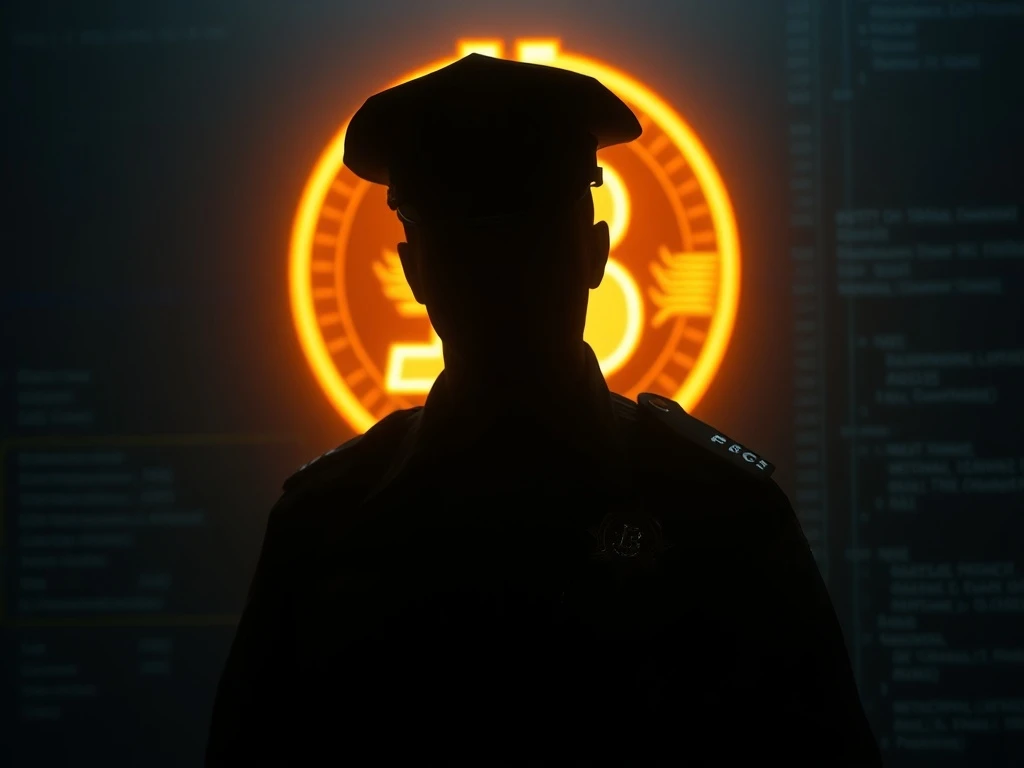Shocking: UK Officer’s Bitcoin Theft During Silk Road 2.0 Investigation Leads to 5-Year Prison Sentence

In a development that sends ripples through the cryptocurrency community and law enforcement agencies alike, a former UK National Crime Agency (NCA) officer has been jailed for stealing 50 Bitcoin (BTC) during a high-profile investigation. This audacious act of a UK officer Bitcoin theft highlights the complex challenges of securing digital assets, even within the very institutions tasked with fighting cybercrime. It’s a stark reminder that even those sworn to uphold the law can succumb to temptation when faced with the immense value of cryptocurrencies.
The Audacious UK Officer Bitcoin Theft Uncovered
The story unfolds around Paul Chowles, an ex-operational officer with the National Crime Agency, who was a key part of the team investigating the notorious Silk Road and its successor, Silk Road 2.0. In a stunning betrayal of trust, Chowles was sentenced to five-and-a-half years’ imprisonment for stealing 50 Bitcoin. At the time of the theft in 2017, these funds were valued at approximately $79,000, but their current worth has skyrocketed to nearly $5.9 million, underscoring the severe implications of his actions. Chowles pleaded guilty to charges including theft, transferring criminal property, and concealing criminal property, revealing a deliberate scheme to enrich himself at the public’s expense.
Inside the Silk Road 2.0 Investigation and Bitcoin Seizure
To fully grasp the gravity of this incident, it’s essential to understand the context of the Silk Road 2.0 investigation. Silk Road 2.0 emerged swiftly after the original dark web marketplace was dismantled and its founder, Ross Ulbricht, was arrested in October 2013. For about a year, it operated as a major hub for illicit activities before also being shut down by the FBI. Chowles’ role was pivotal; he was the lead officer tasked with extracting and analyzing data from devices belonging to Silk Road 2.0 co-founder, Thomas White. It was during this critical phase that Chowles had access to White’s digital assets. The NCA had seized 97 Bitcoin from White in November 2014, but a significant portion—50 BTC—was illicitly transferred from White’s wallet in May 2017, sparking a complex investigation into the disappearance of the funds.
How Paul Chowles’ Prison Sentence Unfolded
Chowles’ attempts to cover his tracks were sophisticated but ultimately futile. After transferring the 50 BTC, he funneled the funds through Bitcoin Fog, a notorious crypto mixing service, in a clear effort to obscure their origins. However, the advanced analytics tools of Chainalysis proved instrumental in tracing the stolen funds. Their technology helped identify that some of the Bitcoin was converted to cash via exchanges or loaded onto crypto-enabled debit cards, making them easier to spend. Initially, the NCA investigation team mistakenly believed Thomas White himself had managed to access his wallet and move the Bitcoin, writing it off as untraceable. But White, surprisingly, alerted authorities, insisting that someone within the NCA must have moved the funds, as only they possessed the keys to his crypto wallet. This crucial tip-off led to a joint investigation with Merseyside Police, a meeting Chowles himself attended, ultimately leading to his arrest and subsequent Paul Chowles prison sentence.
The NCA Crypto Theft: A Betrayal of Trust
The implications of this NCA crypto theft extend far beyond the stolen Bitcoin. It represents a profound betrayal of public trust and a stain on the reputation of a vital law enforcement agency. Investigators found compelling evidence linking Chowles to the crime, including a phone used for Bitcoin transfers with suspicious internet search history for a crypto exchange. More damningly, notebooks discovered in Chowles’ office contained usernames, passwords, and statements directly related to White’s cryptocurrency accounts, proving his direct access and intent. While Chowles spent approximately £109,425 ($146,580) using crypto-enabled debit cards, the Crown Prosecution Service (CPS) calculated his total financial benefit to be around £613,150 ($821,345), reflecting the significant appreciation of Bitcoin since the theft. The CPS has confirmed it will pursue confiscation proceedings against Chowles, aiming to recover the ill-gotten gains.
Lessons from This Bitcoin Crime UK Case
This incident serves as a critical case study in the evolving landscape of Bitcoin crime UK and highlights several key takeaways for both law enforcement and the wider crypto community. Firstly, it underscores the persistent challenge of internal corruption, especially when dealing with high-value, easily transferable digital assets. Secondly, it demonstrates the growing efficacy of blockchain analytics firms like Chainalysis in tracking illicit crypto flows, even when mixers are used. Thirdly, it emphasizes the importance of robust internal controls and oversight within agencies handling seized digital assets. The fact that the initial suspicion fell on the victim rather than the perpetrator within the agency points to potential vulnerabilities in protocols. This case will undoubtedly lead to a re-evaluation of how seized cryptocurrencies are managed, secured, and audited to prevent future incidents of this nature.
Conclusion: Upholding Integrity in the Digital Age
The conviction and sentencing of Paul Chowles send a clear message: law enforcement officers who exploit their positions for personal gain, particularly in the realm of complex digital assets, will be held accountable. This case, born from the depths of a Silk Road 2.0 investigation, underscores the critical need for unwavering integrity, advanced forensic capabilities, and stringent internal oversight in the fight against cybercrime. As the world becomes increasingly digital, ensuring trust and security, even within the very institutions designed to protect us, remains paramount.








